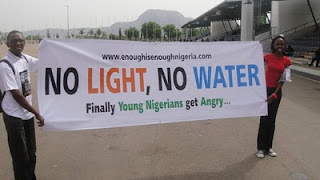

All praise is due to Allah, the Lord of the universe. May His peace and blessings be upon the noble Prophet Muhammad (Peace be upon him), his faithful companions and dutiful followers till the end of time, Amin.
The Muslim Congress (TMC) condemns in very strong words the disruption of a Jumat service at University of Ibadan by a sponsored Christian extremist in the person of Ms Seun Bunmi Adegunsoye, a 400-level law student of University of Ibadan. On the first Friday in the Blessed month of Ramadan (corresponding to 13th August,2010), she mustered the gut and arrogantly went into the University of Ibadan Muslim community mosque, while Muslim worshipers were engrossed in prayers screaming irresponsibly in the precincts of the mosque, "Jesus is the way, accept him. Jesus will soon come; Allah is not the way! Except you accept Jesus Christ into your life, you are not safe. All of you here, no matter the number of the congregation, accept Jesus Christ. Allah is not God; Jesus is Lord".
The above act of aggressive trespass and monumental intolerance in an enlightened community could have degenerated into deadly beaten and assault on her person, had the angry Muslim congregation been allowed to handle the matter on their own. The commendable and fatherly intervention of the Chief Imam, Professor Abdurrahman Oloyede, as expected of a Muslim leader, saved the day. Worse still, the community could have been engulfed in Christian-Muslim crisis!
We wish to state clearly that the action of Ms Seun Bunmi Adegunsoye is a flagrant violation of the sanctity of the mosque and an orchestrated insult on the collective intelligence of Muslims and Islam, not only in University of Ibadan but in Nigeria at large. Muslims by our glittering antecedents are peace-loving, but our gentility, simplicity and civility should not be taken for stupidity and timidity by peddlers of bigotry, intolerance, hate and Islamaphobia. There is no instance in any campus throughout the federation, where Muslim students or staff violated the sanctity of church by forcing their way into places of worship reserved for Christians, because our religion preaches peace, tolerance, mutual love and respect for the views of other religions. Universally, mosque is a respected place of worship and the young over-zealous Christian lady violated its sanctity, by coming in to win souls for Jesus Christ, yet few newspapers mildly reported this incident and even those that carried it failed to comment on the danger it portends for peaceful coexistence in the campuses and the country.
The Muslim Congress (TMC) wishes to state that the above incident is reminiscent of what is happening in the Northern part of the country, where those who call themselves Evangelists and hate theologians aggressively attempt to force hybrid Christianity on the Muslims and their children in a manner that is far from, and inimical to the provision of the Nigerian Constitution, which guarantees freedom of speech and conscience to all Nigerians. Attempts by Muslims to rebuff these aggressive methods of evangelisation often lead to crisis, and the reactions of helpless Muslims quickly attract the attention of some mischievous and biased media organisations, that are on the payroll of the missionaries or that have soft spot for their cause and agenda.
We therefore humbly call upon the Minister for Education, Professor Rukayyat Rufai, University's Governing Council Chairman, Chief Wole Olanipekun (SAN), Vice Chancellor, Professor Olufemi Bamiro, Inspector-General of Police, Ogobonnaya Onovo and Sultan of Sokoto/President National Supreme Council of Islamic Affairs, Alhaji Muhammad Saád Abubakar III to beam their search-lights on the various campuses to avert a recurrence of this type of nauseating incident of extremism. Indeed, it is an agenda, which would soon be repeated and replicated in other campuses in Nigeria, if this one is allowed to go without appropriate reprimand and sanction from the University authorities. Planners of this drama are bent on wining souls for Christ by crook and intimidation of students under the aegis of Muslim Student's Society (MSSN). Whereas, the quality of a soup is better experienced in the taste and aroma, not in useless advertisement and dead propaganda by the cook. Islam thrives on truth, goodwill, respect and morals. We do not force our religion down people's throats, nor insult other people's gods and desecrate the sanctity of their temples. The Ivory Towers should not be used as safe havens by fanatical lecturers, bigots and faith supremacists to groom soldiers ready to unleash havoc on the Muslim Communities and MSSN in tertiary institutions in Nigeria.
In conclusion, we humbly counsel the Nigeria media outfits to be responsive, objective, unbiased, balanced and patriotic in their reporting of events as it affects Muslims and Islam in Nigeria. After all what is good for the goose is equally good for the gander. We advocate a crisis-free society and passionately demand justice!
Long live Nigeria Media and Federal Republic of Nigeria.
SIGNED
Luqman AbdurRaheem, AMNIM, AMIMC, AMIOE
Amir, The Muslim Congress


